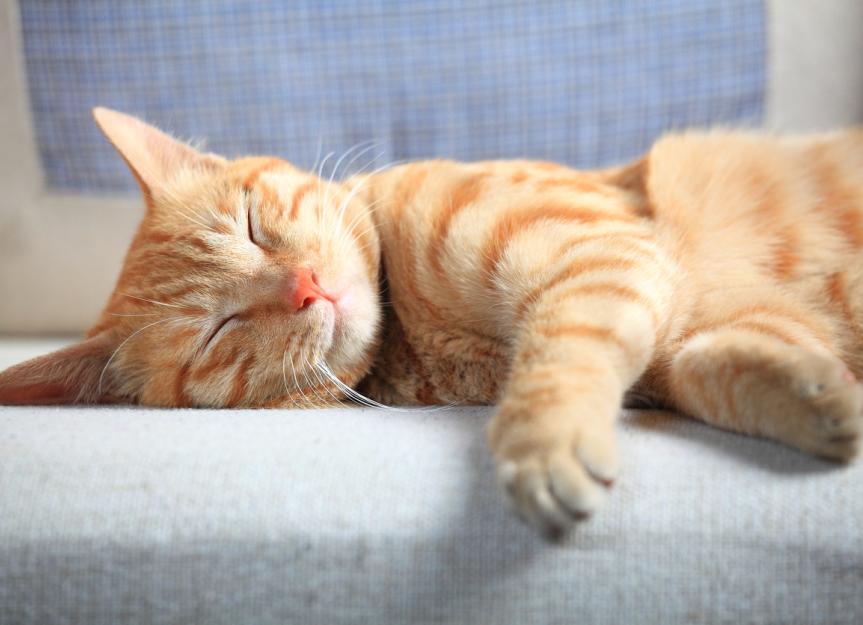Gas in Cats
What Is Gas in Cats?
Gas, or flatulence, in cats is not very common. As a result, if your cat starts passing gas or does so more frequently, with or without odor, there may be an underlying gastrointestinal (GI) issue that needs to be discussed with your veterinarian.
Causes of Gas in Cats
Flatulence in cats can be caused by a variety of conditions, ranging from something relatively straight-forward and easily treated, like intestinal upset caused by a diet change, to something more complicated and life-threatening.
One of the more common causes of stomach upset in cats comes from changing a cat’s food (including manufacturer or raw ingredients) without a 7- to 10-day transition period. In more sensitive cats, even starting a new bag of the same food can trigger gas. Dietary issues are also commonly caused by diets with too much fiber, a type of fiber that produces gas, and/or including a protein source your cat is sensitive to.
However, there can be more serious causes of flatulence, including:
Intestinal parasites
Infection (bacterial or viral)
Microbial imbalance (called small intestinal bacterial overgrowth or SIBO)
Inflammatory bowel disease (IBD)
Malabsorption conditions, where nutrients are inefficiently absorbed
How Veterinarians Diagnose Gas in Cats
Your veterinarian will likely begin by getting a thorough history from you. This will include questions about:
Your cat’s current diet (including treats)
Frequency and timing of flatulence
Any other symptoms (e.g., soft stools or diarrhea, changes in stool color, inappropriate use of the litterbox, nausea/drooling or vomiting)
Any changes in activity or appetite
Your vet will then perform a physical exam to check for underlying causes. This will include palpating (touching) your cat’s belly to check for discomfort, pain, bloating, or anything else abnormal. The next steps will depend on your cat’s conditions, but tests that might be needed include fecal (poop) floatation for parasites, fecal occult blood test or culture, assessment of vitamin B12/folate levels, and other blood work.
Treatment for Gas in Cats
Treatment for flatulence will depend on the underlying cause. If there are no other symptoms and test results didn’t determine a cause, your veterinarian may recommend a diet trial with probiotics and prebiotics to help with digestion.
Generally, a diet trial includes a slow transition, over 7 to 10 days, to a new food containing fewer carbohydrates and/or a new protein source. The diet recommended is likely to be canned, as these tend to be naturally lower in carbohydrates. Diets containing legumes, like peas, lentils, or beans should also be avoided as these ingredients produce more gas. Probiotic and prebiotic supplementation with products likeForti-Flora®,Proviable®, and Prostora® can also help by restoring healthy microbes in the GI tract.
Medications, like simethicone, that reduce the surface tension of gas bubbles to help them break down may be recommended for short-term relief of flatulence. These should not be relied on long term, however, because these medications are not a fix for the underlying issue. If a more serious GI condition is suspected or confirmed, additional medications may include deworming medications, vitamin B12 injections, or steroids.
Recovery and Management of Gas in Cats
Flatulence may improve in as quickly as two weeks if your car responds to diet changes. If the condition developed because of a rapid diet change, the gas is unlikely to return if future diet transitions are made slowly. If intestinal parasitism is determined to be the cause, complete recovery should be possible once the parasites are treated.
If a dietary intolerance or more serious underlying gastrointestinal condition is diagnosed, long-term management may be needed, including giving a special diet or daily medications. Follow-up visits with your veterinarian may also be necessary to periodically re-evaluate the condition and adjust the treatment plan as necessary.
Gas in Cats FAQs
Is it normal for cats to pass gas a lot?
Passing gas is not common in cats, so new or increased flatulence is a reason to contact your veterinarian to determine a diagnosis.
Why does my cat’s gas stink?
Foul smelling flatulence in cats indicates a dietary protein intolerance and should be addressed by changing your cat’s diet to a new protein source as recommended by your veterinarian.
蠕虫会导致气体在猫?
Yes, intestinal parasites (worms) are a cause for gas production and flatulence in cats. This condition can be diagnosed with a fecal (poop) examination and is treated with deworming medications.
How can I relieve my cat’s gas?
The best way to relieve your cat’s gas depends entirely on the underlying cause. A visit to your veterinarian is needed to fully evaluate the problem and come up with the proper treatment plan.
What is excessive gas passing in cats a sign of?
Excessive passing of gas in cats is usually a sign of dietary intolerance, either from a recent diet change or the type of food being fed (carbohydrate or protein source). It can also be a symptom of underlying gastrointestinal disease, like intestinal parasites, infection, inflammation, bacterial imbalance, or nutrient malabsorption.
References
Guilford WG, Jones BR, Markwell PJ, Arthur DG, Collett MG, Harte JG. Food Sensitivity in Cats with Chronic Idiopathic Gastrointestinal Problems. Journal of Veterinary Internal Medicine. 2001;15(1):7-13.
Gaschen FP, Merchant SR. Adverse Food Reactions in Dogs and Cats. Veterinary Clinics of North America: Small Animal Practice. 2011;41(2):361-379.
Roudebush P. The gas they pass: How to manage flatulence. Proceedings of the Western Veterinary Conference, 2006.
Grześkowiak Ł, Endo A, Beasley S, Salminen S. Microbiota and probiotics in canine and feline welfare. Anaerobe. 2015;34:14-23.
Featured Image: iStock.com/fatesun
Help us make PetMD better
Was this article helpful?
